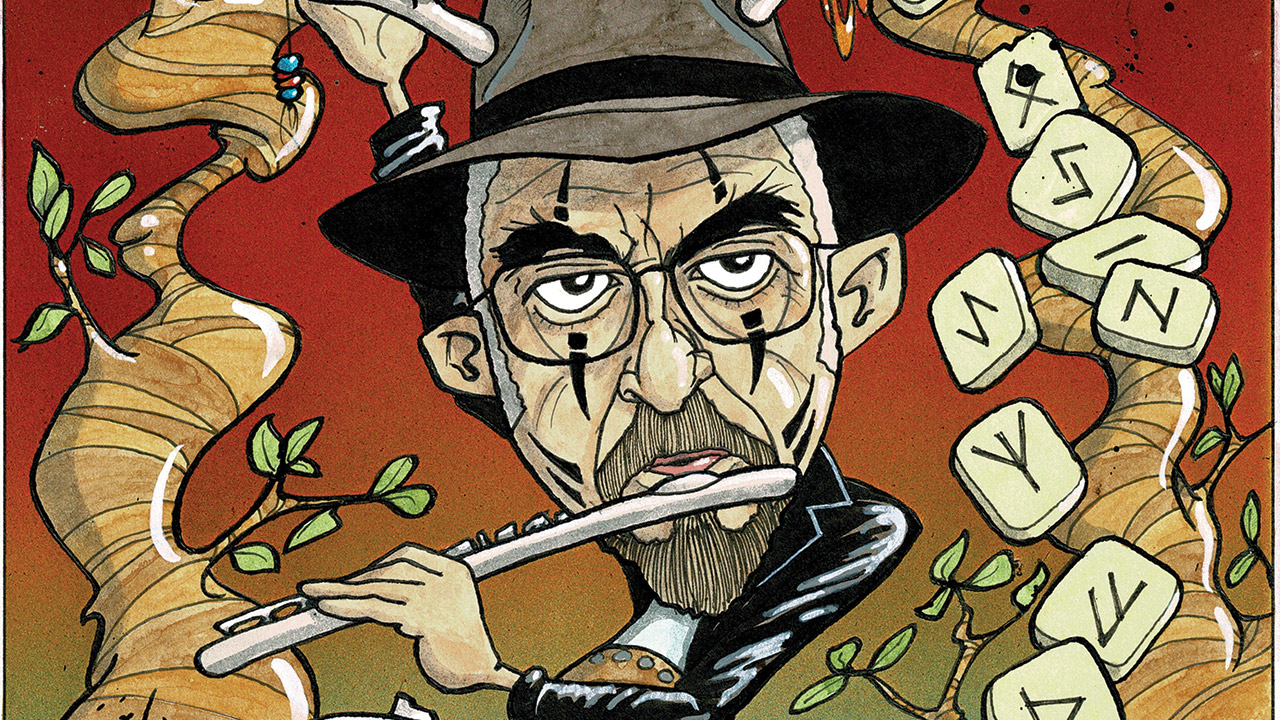You can trust Louder
When Ian Anderson began treading the boards in the early 1960s, there was never any expectation that bashing out a few blues standards could lead to something like a proper career. Pop stars came and went – even The Beatles thought all the fuss would blow over soon enough. If they were lucky they’d make a few hits, meet a few stars, have a few laughs and bank a few stories to tell the customers frequenting the shop they’d probably open in their settled-down post-pop life.
Well, that might have been the theory back then but somebody must have forgotten to pass the memo on to Anderson. Driven by a fearsome, unrelenting work ethic for more than half a century, the singing flautist and the current incarnation of Jethro Tull are back with their 23rd studio album, RökFlöte.
As with his readings around the tenets of Christian religion on The Zealot Gene and before it Homo Erraticus’ criminally underrated consideration on the interaction between migration and culture, RökFlöte is an extended study of a particular subject that’s hooked Anderson’s attention in the past. Mythology, legends and humankind’s deep connection to the pagan Earth itself have all been fertile ground for artists from all disciplines, and over the years Anderson has tilled more than his fair share of important plots in that particular field. Beltane, Dun Ringill, Kelpie, Jack In The Green, A Cold Wind In Valhalla and other numerous folkloric touchstones stand out in the Tull landscape.
RökFlöte’s 12 songs dig into the pagan realm of the Norse gods and the medieval Viking culture that sought their blessing deeper than ever before. At one level it’s an ancient world long gone and far removed from our modern life. Yet vestigial bonds of connection continue to thread themselves into present times through the days of the week: Tyr, Wo¯den, Thor, Freya – or Tuesday, Wednesday, Thursday and Friday, for those who prefer to anglicise the old gods. Anderson goes far beyond such a largely superficial example and one gets the sense that he’s never happier than when researching, burrowing deep and wide into a subject, spurring him on as much as writing the music.
Here, Ginnungagap, Hammer On Hammer and Wolf Unchained all bear the hallmark of classic Tull hovering somewhere between a metallic-clad cèilidh band with attitude and a professorial chamber rock ensemble delighting in their rhythmic and textural complexity. That is, one could imagine all these tunes being a welcome and substantial all-killer-no-filler addition to the live setlist at almost any point in the band’s history. With all the band pulling their weight, it’s nevertheless worth mentioning that guitarist Joe Parrish-James’ catalysing presence is especially good throughout as he builds slabs of heavy duty riffage on the monumental Wolf Unchained. His whirlwind solo spectacularly builds to a tail-spinning frenzy that’s underpinned by John O’Hara’s gothic-edged keyboards, producing an impressive and thrilling conclusion. The ability to switch between that kind of savage lyrical articulation and the spiky foundational chord structures deftly articulates the balance that’s been wired into Tull’s modus operandi since Stand Up.
Of course, Anderson is the overarching presence. The limitations of his vocal range are evident as they have been for several years now. That rapier-like voice that’s been central to Tull’s cut-and-thrust dynamic has undeniably and understandably thinned, as with a vocal bandwidth that’s been dulled and narrowed by age and health. Always a practical and pragmatic player used to problem solving, over time he’s evolved a conversational approach to his lyrics that are infused with a nimble intimacy, enabling him to carry the material with his customary authority. Aside from his voice, the signature sound of the record is, as always has been, the flute. His instrumental capacity, with its increased precision and lyrical concision is as dextrous and as vibrant as it has ever been.
Where does RökFlöte sit in the Tull canon? Let’s rule out fatuous ‘it’s not as good as Aqualung’-style proclamations. Instead, one looks to compare the writing and performance with the latter-period repertoire. Coherent and confident throughout, with a collection of songs resounding with personality, meaning and drama, it feels and sounds like a band that’s moving forward.
Sign up below to get the latest from Prog, plus exclusive special offers, direct to your inbox!
At 75 years old, Anderson is entering the final stretch of a remarkably productive career. It’s to his credit that he can produce music of this quality and calibre. Tull aren’t a band living in the past but one that firmly occupies the here and now, with Anderson, like the Allfather himself, towering over the very centre of it all. Long may he continue.
Sid's feature articles and reviews have appeared in numerous publications including Prog, Classic Rock, Record Collector, Q, Mojo and Uncut. A full-time freelance writer with hundreds of sleevenotes and essays for both indie and major record labels to his credit, his book, In The Court Of King Crimson, an acclaimed biography of King Crimson, was substantially revised and expanded in 2019 to coincide with the band’s 50th Anniversary. Alongside appearances on radio and TV, he has lectured on jazz and progressive music in the UK and Europe.
A resident of Whitley Bay in north-east England, he spends far too much time posting photographs of LPs he's listening to on Twitter and Facebook.


